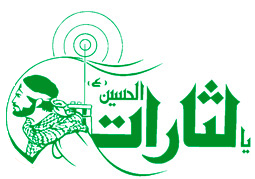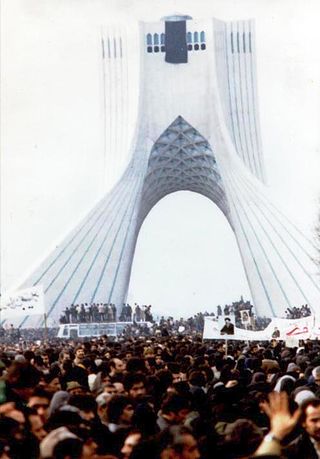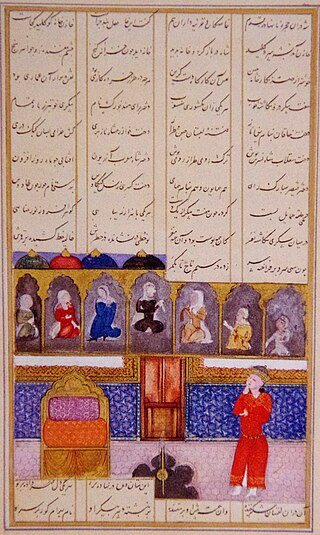
Sharif University of Technology (SUT); (Persian: دانشگاه صنعتی شریف, romanized : Dāneshgāh-e sana'ti-e sharif) is a public research university in Tehran, Iran. Nicknamed "the MIT of Iran", it is widely considered to be the nation's most prestigious and leading institution for science, technology, engineering, and mathematics (STEM) fields. Every year, the smartest and the most prospective students in Iran, ranked according to the results of the Iranian University Entrance Exam, choose to study at SUT at Bachelor's, Master's as well as PhD levels. For those students who wish to study STEM related fields, especially the most popular ones such as Computer engineering, Electrical engineering and Mechanical engineering, Sharif University of Technology is the toughest Iranian university to get admission to.

Ansar-e Hezbollah is a conservative paramilitary organization in Iran. According to the Columbia World Dictionary of Islamism, it is a "semi-official quasi-clandestine organization of a paramilitary character that performs vigilante duties".
Shams, an Arabic word meaning sun or spark may refer to:
Organ and organs may refer to:

The Organization of Struggle for the Emancipation of the Working Class, or simply Peykar, also known by the earlier name Marxist Mojahedin, was a splinter group from the People's Mojahedin of Iran (PMOI/MEK).

Several left-wing guerrilla groups attempting to overthrow the pro-Western regime of Shah Mohammad Reza Pahlavi were notable and active in Iran from 1971 to 1979. The groups shared a commitment to armed struggle, but differed in ideology. Most were Marxist in orientation. The largest group — People's Mujahedin of Iran — was founded as a left wing movement with the aim to overthrow Iran's cleric rule.
The Labourer's Creed is an Iranian Marxist-Leninist political organization formed in 1978, by former affiliates of other leftist groups. It is currently exiled in Germany.
Qorban Peykar is a village in Maraveh Tappeh Rural District, in the Central District of Maraveh Tappeh County, Golestan Province, Iran. At the 2006 census, its population was 356, in 64 families.
Panj Peykar is a village in, and the capital of, Jafarbay-ye Jonubi Rural District of the Central District of Torkaman County, Golestan province, Iran. The previous capital of the rural district was the village of Si Joval, now a city.

Haft Peykar also known as Bahramnameh is a romantic epic by Persian poet Nizami Ganjavi written in 1197. This poem forms one part of his Khamsa.
Motherland Party, National Party or Patriotic Party was a party in Iran during 1940s. It was a small organization of intellectuals and a triumvirate of three parties called Peykār (transl. Battle) Esteqlāl (transl. Independence) and Mihanparastān (transl. Patriots).

Socialism in Iran or Iranian socialism is a political ideology that traces its beginnings to the 20th century and encompasses various political parties in the country. Iran experienced a short Third World Socialism period at the zenith of the Tudeh Party after the abdication of Reza Shah and his replacement by his son, Mohammad Reza Pahlavi. After failing to reach power, this form of third world socialism was replaced by Mosaddegh's populist, non-aligned Iranian nationalism of the National Front party as the main anti-monarchy force in Iran, reaching power (1949–1953), and it remained with that strength even in opposition until the rise of Islamism and the Iranian Revolution. The Tudehs have moved towards basic socialist communism since then.
Lt. Colonel Lewis Lee Hawkins was a United States military aide to Iran who was assassinated. Vahid Afrakhteh, a member of the Mojahedin M.L. (Marxist–Leninist) and later a founding member of Peykar, was captured and confessed to the assassination. Some sources attribute the assassination to the People's Mujahedin of Iran.

Colonel Paul R. Shaffer (1930–1975) was a United States military aide to Iran who served as an air force pilot in both Korea and Vietnam. In 1975, he was assassinated along with Lieutenant Colonel Jack H. Turner. Vahid Afrakhteh, a founding member of Peykar, confessed to the killing and later was executed. Nevertheless, some sources have falsely attributed the assassination to the People's Mujahedin of Iran (MEK), a group which Vahid Afrakhteh and Peykar tried to eliminate.

On 3 August 1979, Constitutional Convention election was held in Tehran Province constituency with plurality-at-large voting format in order to decide ten seats for the Assembly for the Final Review of the Constitution

Majid Naficy, also spelled "Majid Nafisi" and "Madjid Nafissi", is an Iranian-American poet. He was the youngest member of the literary circle Jong-e Isfahan and was considered the Arthur Rimbaud of Persian poetry in the late 1960s in Iran. He was a member of the Confederation of Iranian Students in Los Angeles in 1971, and a member of the independent Marxist Peykar Organization after the Iranian Revolution from August 1979 until spring 1982.
The Septuple Coalition was the electoral alliance of seven communist political groups contesting in the 1979 Iranian Constitutional Convention election with the stated objective of "exposé". The alliance also endorsed candidates of the Organization of Iranian People's Fedai Guerrillas –which was not part of the coalition– despite the differences between them.

Peykar was a weekly newspaper in Iran that was published as the official organ of the communist organization Organization of Struggle for the Emancipation of the Working Class.
Torab Haghshenas was an Iranian revolutionary, author and translator. Haghshenas who was notably the only People's Mojahedin Organization of Iran (MEK) leader with seminary education, sided with the group's Marxist faction in 1975 and co-founded the Organization of Struggle for the Emancipation of the Working Class in 1979.

Pourandokht "Pouran" Bazargan was an Iranian teacher, revolutionary and translator. She was notably the first female member of the People's Mojahedin Organization of Iran (MEK).










